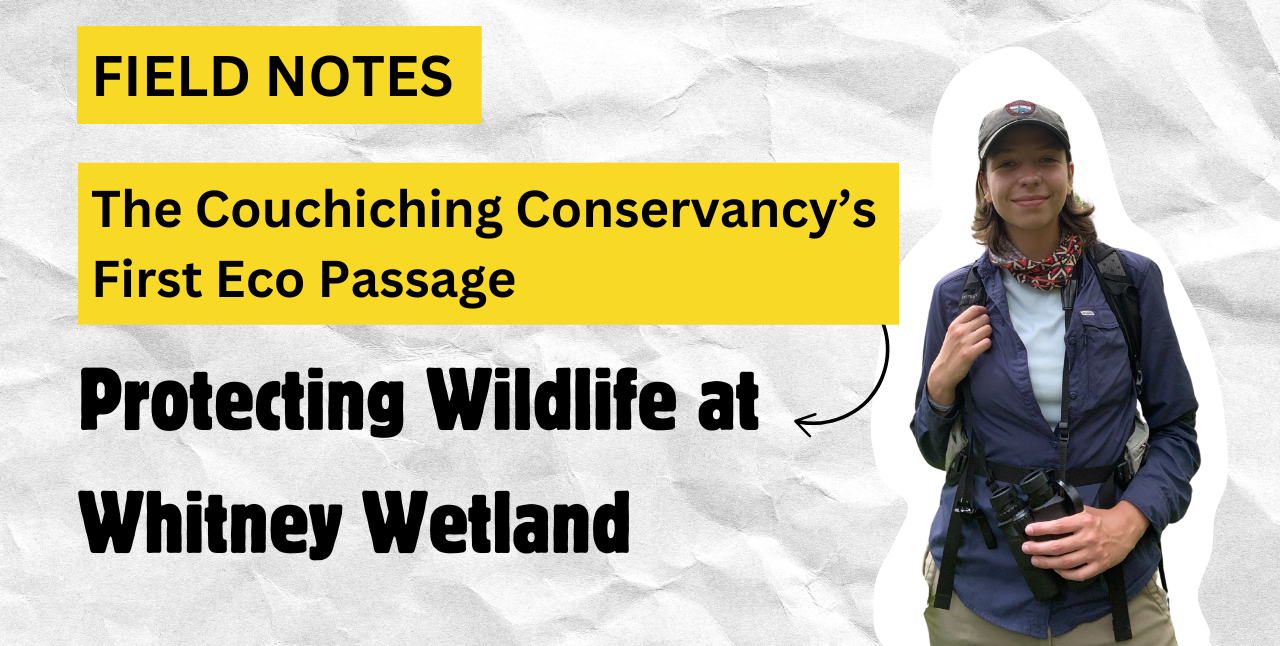Every year, thousands of animals face a perilous journey across roads, risking their lives in the face of speeding vehicles. For salamanders, frogs, and many other species near Whitney Wetland & McIsaac Nature Reserve, this danger has been especially pronounced. Thanks to The Couchiching Conservancy’s Wildlife on Roads Community Science program, this critical issue is being addressed through the installation of our first-ever eco passage.
A Community Effort to Protect Wildlife
The journey to creating this eco passage began with our community. Volunteers participating in the Wildlife on Roads program, coordinated by our dedicated staff, logged sightings of roadkill and wildlife crossings along Monck Road. Their data revealed a “pinch point” where road mortality rates were alarmingly high. This site became the focal point of our efforts.
The planned upgrades will include retrofitting an existing box culvert with a terrestrial pathway and enhancing the surrounding area to encourage animals to use this safer route. Why is this important? Many species are hesitant to use culverts because they are unnatural structures that can feel unsafe. By upgrading the design and incorporating elements that mimic a natural environment, we can guide wildlife toward the passage—and away from the road.
Why Eco Passages Matter
Eco passages, such as wildlife overpasses, underpasses, or culverts, are vital tools in conservation. They provide safe crossings for animals while reducing roadkill and minimizing hazards for drivers. These structures:
- Preserve Biodiversity: Road mortality significantly impacts populations of turtles, frogs, and other species, particularly those that are already threatened. Eco passages help sustain these populations by offering a safe alternative.
- Enhance Connectivity: For animals, roads often create barriers that isolate populations. Eco passages reconnect fragmented habitats, supporting genetic diversity and long-term survival.
- Promote Road Safety: By guiding animals away from roads, eco passages also reduce the risk of accidents, making travel safer for everyone.
A Safer Future for Local Species
At Whitney Wetland Nature Reserve, the planned eco passage will help protect species such as frogs and small mammals—some of which are already vulnerable to population declines. By choosing the culvert over the road, these animals will have a greater chance of survival, contributing to a thriving ecosystem.
This project also highlights the power of collaboration. Our volunteers’ commitment to observing and reporting wildlife on roads provided the data needed to pinpoint problem areas and take action. With these upgrades, we’re not just saving wildlife—we’re fostering a deeper connection between people and nature.
Get Involved
The Couchiching Conservancy is committed to protecting wildlife and their habitats. If you’d like to support projects like this, consider becoming a volunteer, donating, or spreading the word. Together, we can build a future where wildlife and people thrive side by side.
Stay tuned for updates as this project takes shape and the eco passage becomes a model for conservation in action.

